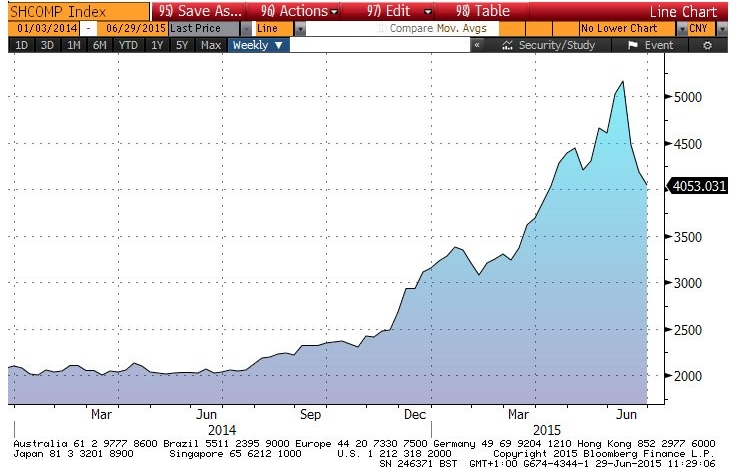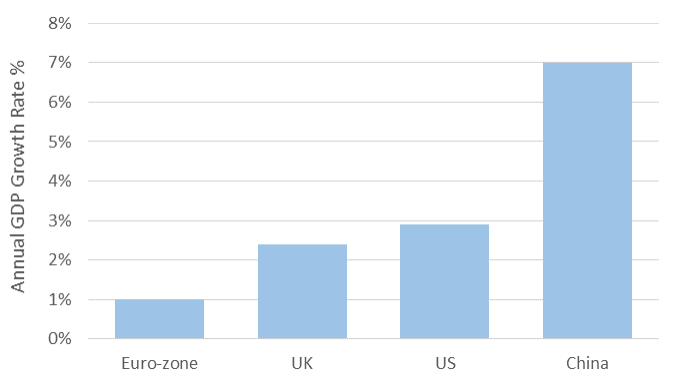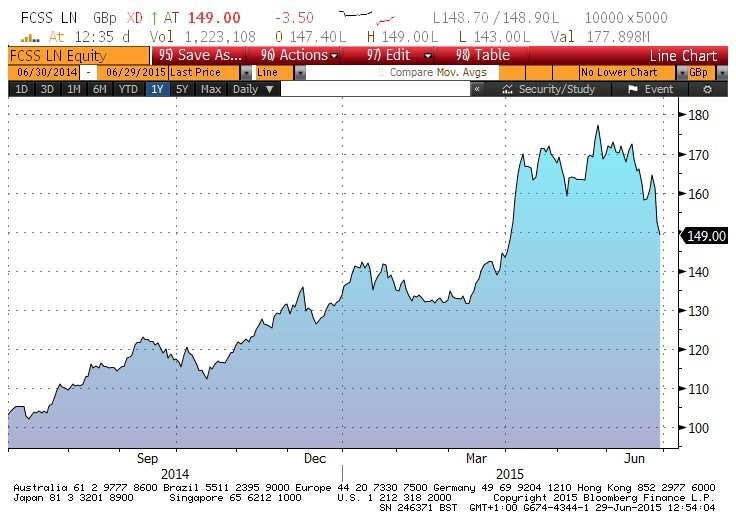Edmund Shing: Time to get bullish as the Chinese investment market bottoms out
Is the party finally over for the world's largest economy? No, I am not talking about the United States, but rather China. And before you start complaining about my facts; yes, China is officially the world's largest economy according to a recent World Bank report.
Chinese shares have been on a tear since the middle of 2014. The Chinese benchmark stock market index, the Shanghai Composite, rose from just over 2,000 in July 2014 to touch a recent high of nearly 5,200 by the middle of June (Figure 1). That is a gain of over 150% in less than a year.

What is equally evident from Figure 1 is the plunge that has followed; Chinese shares have lost over 20% in just over 2 weeks following this new high, moving from just shy of 5,200 all the way back to just over 4,000. That is some roller coaster ride for Chinese investors...
Is the China party over?
So, is the Chinese stock market party over then? Certainly, those Chinese domestic investors who have indulged in margin trading (borrowing money to invest in the stock market) are getting their fingers burnt right now.
It is this "margin trading" effect that fuelled part of the Chinese stock market's meteoric rise over the past months, and is now at least partly responsible for the speed of the decline too.
But, I would still argue that there are several reasons to remain optimistic on China for the longer-term.
Firstly, Chinese economic growth is still running at an impressive 7% annual rate, even if it is slowing. Compare this to the US or Europe, where annual economic growth rates hover between 1% and 3% (Figure 2).

Secondly, the Chinese central bank, People's Bank of China, are effectively pumping a large amount of money into the Chinese economy via lower interest rates in order to boost growth further.
This should have a positive effect on the stock market, as we have already seen from central bank stimulus efforts in the US and UK.
Thirdly, Chinese domestic investors on average hold only a small proportion of their household wealth in shares.
On average, Chinese households continue to hold 60-70% of their financial assets in cash. And their favourite investment asset class other than cash deposits at the bank continue to be of the classic bricks-and-mortar type, i.e. in property.
Over time, with the ageing of the Chinese population and the growing need for Chinese households to save for retirement, investment in the stock market by Chinese domestic investors looks sure to continue to grow.
This trend will provide plenty of demand for Chinese shares for years to come as private pension funds are built up gradually. Don't forget that the current Chinese government is actively encouraging investment in Chinese shares, in part in order to cool down an overheating domestic property market.
We are likely to see further financial market liberalisation reforms from the Chinese government in the months and years ahead, which again should be supportive of the stock market.
How to put some China in your portfolio
While the present slump in Chinese shares may not quite be over yet, it is best to get ready in anticipation of a fast-approaching market bottom. This could represent a good entry point for long-term investors.
There are several relatively easy ways to buy into Chinese shares via funds - here are a couple that I like.

The Fidelity China Special Situations investment trust (code: FCSS).
This is a trusty investment listed on the London Stock Exchange that is focused on high-quality Chinese companies, run by an experienced fund manager based out in Hong Kong (Figure 3).
Even with the current drop in share price, this trust has gained 65% in sterling terms over the last year.
It trades currently at a near 17% discount to its net assets; i.e. you can buy 100p of Chinese shares for just 83p via this trust.
The JPMorgan Chinese investment trust (code: JMC).
This trust has a slightly wider "Greater China" investment strategy, investing not only in mainland Chinese shares but also in Hong Kong and Taiwan-based companies.
This JPMorgan trust currently trades at a 16% discount to net assets, i.e. you buy 100p of Chinese, Hong Kong and Taiwanese company shares for just 84p.
The bottom line
While the Chinese stock market may not quite have finished its current relapse, attractive China value opportunities may now be emerging for long-term investors, with Chinese-focused investment trusts on sale at a big discount.
Edmund Shing is the author of The Idle Investor (Harriman House), an expert columnist and a global equity fund manager at BCS AM. He holds a PhD in Artificial Intelligence.
© Copyright IBTimes 2025. All rights reserved.




















